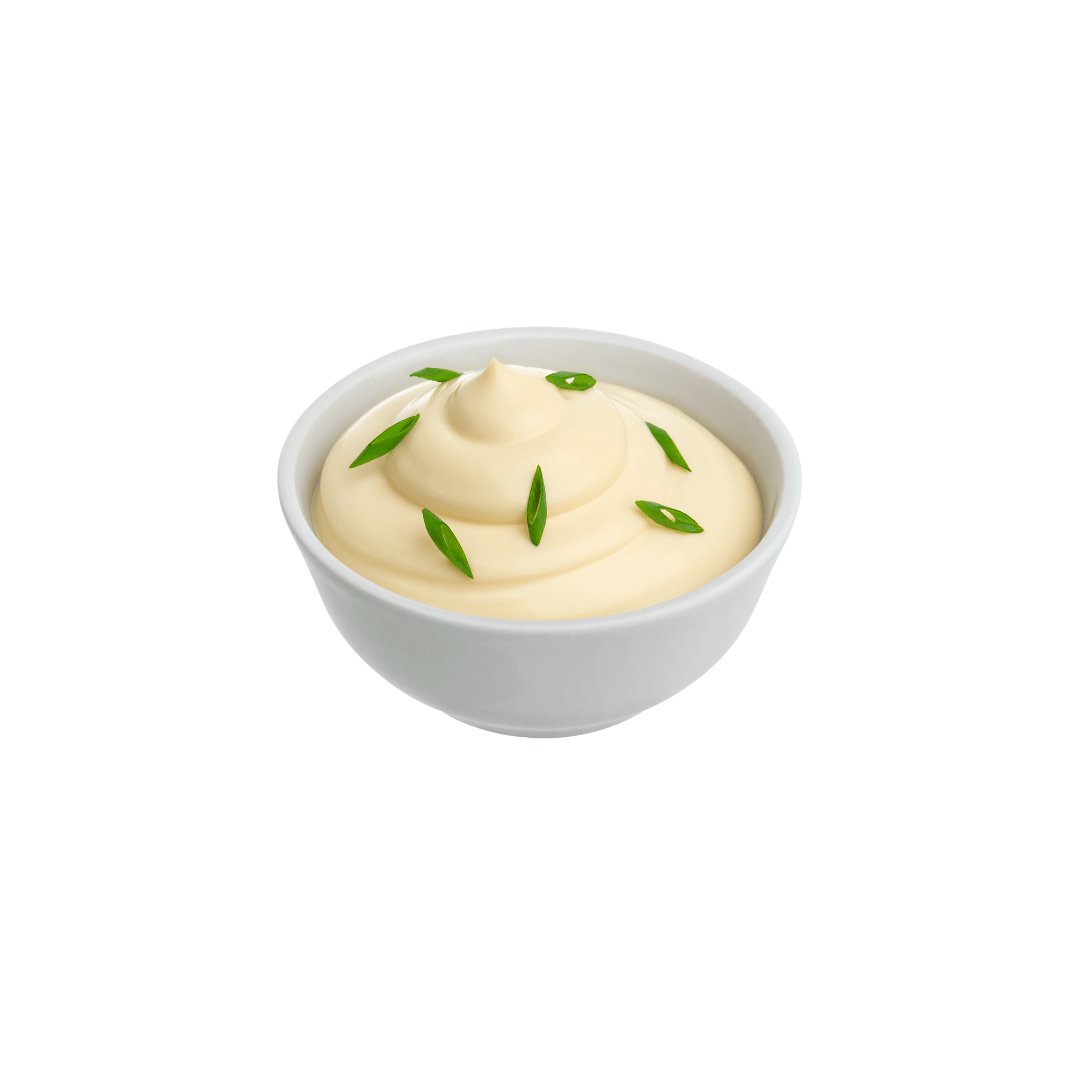About
Sour cream is a dairy product made by fermenting regular cream with lactic acid bacteria. It has a tangy, slightly acidic flavor and a creamy texture.
Health Benefits Of Sour Cream:
-
Good source of calcium: Sour cream is a good source of calcium, which is important for bone health.
-
Provides probiotics: The fermentation process used to make sour cream results in the production of probiotics, which are beneficial bacteria that can improve gut health and boost the immune system.
-
May improve digestion: Probiotics in sour cream can help improve digestion and alleviate digestive issues such as bloating, gas, and constipation.
-
Contains healthy fats: Sour cream is a source of healthy fats, including monounsaturated and polyunsaturated fats, which can promote heart health and reduce inflammation in the body.
-
May boost nutrient absorption: The fats in sour cream can help increase the absorption of fat-soluble vitamins such as vitamins A, D, E, and K, which are important for overall health.
Health Risks of Sour Cream:
- High in calories: Sour cream is relatively high in calories, and consuming too much of it can contribute to weight gain and obesity.
- High in saturated fat: Sour cream is also high in saturated fat, which can increase the risk of heart disease and other health problems if consumed in excess.
-
May trigger digestive issues: While probiotics in sour cream can improve digestion for some people, others may experience digestive issues such as bloating, gas, and diarrhea after consuming sour cream.
-
May contain additives and preservatives: Some brands of sour cream may contain additives and preservatives, which can be harmful to health if consumed in large amounts.
-
May be contaminated with harmful bacteria: If sour cream is not handled or stored properly, it can be contaminated with harmful bacteria such as Salmonella or Listeria, which can cause food poisoning.
Preparation Method of Sour Cream:
Ingredients:
- 1 cup heavy cream
- 1 tablespoon buttermilk
Instructions:
- Pour the heavy cream into a clean glass jar with a tight-fitting lid.
- Add the buttermilk and stir until well combined.
- Cover the jar with a clean cloth or paper towel and secure it with a rubber band.
- Leave the jar at room temperature for 24-48 hours, or until the mixture thickens and develops a tangy flavor. The longer you leave it, the tangier it will become.
- Once the sour cream has reached your desired taste and consistency, stir it well and refrigerate for at least 2 hours before using.
- The sour cream can be stored in the refrigerator for up to 2 weeks.
List of Treatments it can be used in Sour cream :
-
As a topping: Sour cream can be used as a topping for baked potatoes, tacos, nachos, and chili. It adds a tangy flavor and creaminess that complements savory dishes.
-
In dips and spreads: Sour cream can be used to make dips and spreads, such as onion dip, spinach dip, and chipotle dip. It adds a tangy flavor and creamy texture that pairs well with vegetables, crackers, and chips.
-
In sauces: Sour cream can be added to sauces, such as stroganoff, Alfredo sauce, and creamy tomato sauce. It adds a creamy texture and tangy flavor that enhances the richness of the sauce.
-
In baked goods: Sour cream can be used in baking to add moisture and richness to cakes, muffins, and quick bread. It also helps activate baking soda, which is important for leavening.
-
In soups and stews: Sour cream can be added to soups and stews to add a tangy flavor and creaminess. It’s commonly used in potato soup, borscht, and beef stroganoff.
Overall, sour cream is a versatile ingredient that can be used in a variety of dishes to add flavor and texture.
Harms of Overdose Of Sour Cream:
Consuming too much sour cream can lead to several potential health risks. Here are some of the harms of an overdose of sour cream:
-
Weight gain: Sour cream is relatively high in calories and fat, so consuming too much of it can contribute to weight gain and obesity.
-
High cholesterol: Sour cream is high in saturated fat, which can increase levels of LDL (“bad”) cholesterol in the blood. Consuming too much sour cream can lead to elevated cholesterol levels, which increases the risk of heart disease.
-
Digestive issues: Consuming too much sour cream can cause digestive issues such as bloating, gas, and diarrhea. This is because it is high in fat and lactose, which can be difficult to digest in large amounts.
-
Increased risk of foodborne illness: If sour cream is not stored or handled properly, it can become contaminated with harmful bacteria such as Salmonella or Listeria. Consuming too much contaminated sour cream can lead to foodborne illness, which can cause symptoms such as nausea, vomiting, and diarrhea.
-
Nutrient imbalances: Consuming too much sour cream can lead to imbalances in nutrients such as calcium, sodium, and potassium, which can affect overall health.
Per Day Maximum Consumption Chart:
Child (4-8 years): 2 tablespoons (30g)
Child (9-13 years): 4 tablespoons (60g)
Adult man: 8 tablespoons (120g)
Adult woman: 6 tablespoons (90g)
Nutritional Content per Serving (50g):
Energy and Macronutrient Content per Serving(50g) Of Sour cream
| Nutrient | Amount |
|---|---|
| Energy | 110 kcal |
| Carbohydrates | 2g |
| Fats | 11g |
| Proteins | 2g |
| Fiber | 0g |
| Water content | 35g |
Vitamin Content per Serving (50g) Of Sour cream
| Vitamin | Amount |
|---|---|
| Vitamin A | 250 IU |
| Vitamin B1 | 0.02mg |
| Vitamin B2 | 0.11mg |
| Vitamin B3 | 0.4mg |
| Vitamin B6 | 0.03mg |
| Vitamin B12 | 0.4mcg |
| Vitamin C | 0.3mg |
| Vitamin D | 10 IU |
| Vitamin E | 0.3mg |
| Vitamin K | 1.5mcg |
| Folate | 6mcg |
| Biotin | 2mcg |
Mineral Content per Serving (50g) Of Sour cream
| Mineral | Amount |
|---|---|
| Calcium | 70mg |
| Iron | 0.1mg |
| Iodine | 5mcg |
| Zinc | 0.2mg |
| Magnesium | 8mg |
| Phosphorus | 50mg |
| Potassium | 110mg |
| Sodium | 25mg |
| Chloride | 60mg |
| Copper | 0.02mg |
| Chromium | 0.5mcg |
| Fluoride | 5mcg |
| Molybdenum | <1mcg |
| Manganese | <1mg |
| Selenium | 1mcg |
What is sour cream?
Sour cream is a dairy product made by fermenting cream with lactic acid bacteria.
How is sour cream made?
Sour cream is made by adding lactic acid bacteria to cream and allowing it to ferment for several hours.
Is sour cream healthy?
Sour cream is a good source of calcium, but it is also high in fat and calories. It's best consumed in moderation as part of a balanced diet.
How long does sour cream last in the fridge?
Sour cream typically lasts for up to two weeks in the fridge, as long as it's stored properly.
Can you freeze sour cream?
Sour cream can be frozen, but the texture may change once it thaws. It's best to use frozen sour cream in cooked dishes.
What can I substitute for sour cream in a recipe?
Greek yogurt, creme fraiche, and buttermilk are all good substitutes for sour cream in recipes.
Is sour cream gluten-free?
Yes, sour cream is gluten-free.
Can you use sour cream in baking?
Yes, sour cream can be used in baking to add moisture and richness to recipes.
How do you make sour cream sauce?
Sour cream sauce can be made by mixing sour cream with herbs, spices, and other ingredients.
Is sour cream keto-friendly?
Yes, sour cream is keto-friendly as it is low in carbohydrates.
How do you use sour cream in Mexican dishes?
Sour cream is often used as a topping for tacos, burritos, and enchiladas, and can also be used in Mexican-inspired dips and sauces.
Can sour cream be substituted for heavy cream?
Yes, sour cream can be used as a substitute for heavy cream in some recipes, but it will affect the flavor and texture of the final dish.
How do you use sour cream in casseroles?
Sour cream can be used to add richness and creaminess to casseroles, and can also be used as a topping for baked dishes.
How do you make a sour cream and chive dip?
Sour cream and chive dip can be made by mixing sour cream with chopped chives and other seasonings.
How do you store sour cream?
Sour cream should be stored in the fridge in an airtight container.









